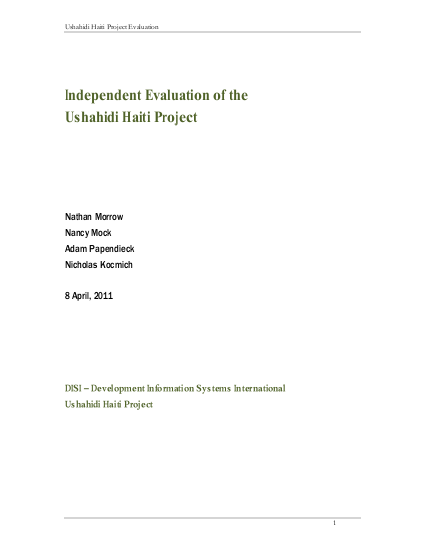
Ushahidi Haiti Project is interested in assessing the effectiveness of the mobilization of the Ushahidi technology platform following the recent earthquake in Haiti, in particular during the initial disaster response phase. The deployment was based out of and managed by students from the Fletcher School of Law and Diplomacy, a graduate school of international affairs based at Tufts University. The evaluation will look at how widely the Ushahidi Haiti platform was used by different organisations, how effectively it was implemented, and how it was communicated to people on the ground. Furthermore, the evaluation will address the appropriateness of Ushahidi Haiti Project’s work; does this form of deployment addresses the real needs of the situation and add value to the response? The evaluation will take place in Boston and Haiti.
The time period being evaluated is January 12 through January 26, the immediate emergency response period. Evaluation Goal: To understand the effect that the Ushahidi Haiti deployment had in the humanitarian crisis response effort in Haiti from January 12 to January 26, 2010 in order to inform future actors that may consider utilizing the crisis mapping platform. Evaluation objectives: This evaluation will have three objectives: 1) effectiveness, 2) efficiency, and 3) relevance. These objectives are defined in the OECD DAC evaluation terminology.
Additional Downloads
Links
Resource collections
- Evaluating humanitarian action
- Monitoring of humanitarian action
- Topics
- UN Habitat - Urban Response Collection
- Urban Response - Urban Crisis Preparedness and Risk Reduction
- Urban Response Collection - Community Engagement and Social Cohesion
- Urban Response Collection - Economic Recovery
- Urban Response Collection - Environment and Climate Change
- Urban Response Collection - Housing, Land and Property
- Urban Response Collection - Urban Crisis Response, Recovery and Reconstruction
- Urban Response Collection - Urban Resilience
